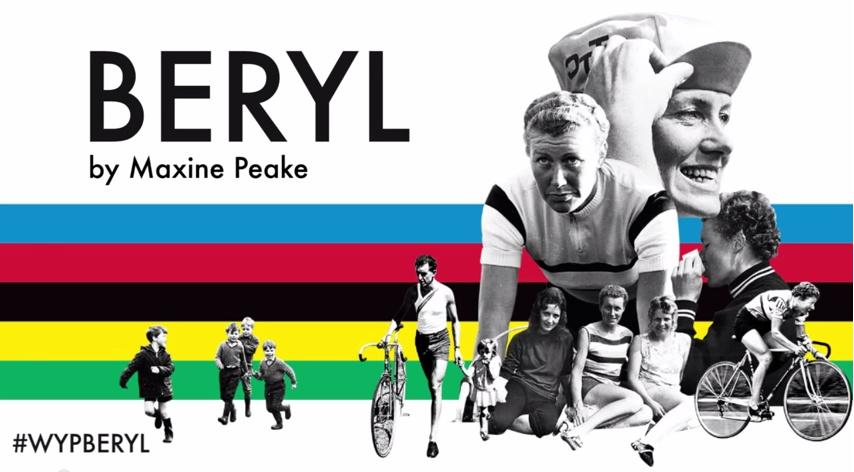- News
- Reviews
- Bikes
- Components
- Bar tape & grips
- Bottom brackets
- Brake & gear cables
- Brake & STI levers
- Brake pads & spares
- Brakes
- Cassettes & freewheels
- Chains
- Chainsets & chainrings
- Derailleurs - front
- Derailleurs - rear
- Forks
- Gear levers & shifters
- Groupsets
- Handlebars & extensions
- Headsets
- Hubs
- Inner tubes
- Pedals
- Quick releases & skewers
- Saddles
- Seatposts
- Stems
- Wheels
- Tyres
- Tubeless valves
- Accessories
- Accessories - misc
- Computer mounts
- Bags
- Bar ends
- Bike bags & cases
- Bottle cages
- Bottles
- Cameras
- Car racks
- Child seats
- Computers
- Glasses
- GPS units
- Helmets
- Lights - front
- Lights - rear
- Lights - sets
- Locks
- Mirrors
- Mudguards
- Racks
- Pumps & CO2 inflators
- Puncture kits
- Reflectives
- Smart watches
- Stands and racks
- Trailers
- Clothing
- Health, fitness and nutrition
- Tools and workshop
- Miscellaneous
- Buyers Guides
- Features
- Forum
- Recommends
- Podcast
review
 Beryl
Beryl£17.00
VERDICT:
Wonderful celebration of a sporting hero and a highly enjoyable piece of theatre
Weight:
0g
Contact:
At road.cc every product is thoroughly tested for as long as it takes to get a proper insight into how well it works. Our reviewers are experienced cyclists that we trust to be objective. While we strive to ensure that opinions expressed are backed up by facts, reviews are by their nature an informed opinion, not a definitive verdict. We don't intentionally try to break anything (except locks) but we do try to look for weak points in any design. The overall score is not just an average of the other scores: it reflects both a product's function and value – with value determined by how a product compares with items of similar spec, quality, and price.
What the road.cc scores meanGood scores are more common than bad, because fortunately good products are more common than bad.
- Exceptional
- Excellent
- Very Good
- Good
- Quite good
- Average
- Not so good
- Poor
- Bad
- Appalling
Beryl Burton is a legend in cycling, but her story is not well-known in the wider world. Playwright and actor Maxine Peake aims to fix that with her excellent play, simply called Beryl.
Beryl Burton has claim to be Britain’s greatest ever sportsperson. Her incredible achievements in cycling include 96 national titles and seven world titles. Her 12-hour time trial record of 277.25 miles remains unbeaten in the women’s field despite the fact that Burton set the record in 1967. So why have so few people heard of her?
Beryl, written by the actor Maxine Peake, aims to bring Burton’s achievements to a wider audience. This production with a cast of just four – John Elkington, Dominic Gately, Chelsea Halfpenny and Penny Layden - tells the story of Burton’s life from her Morley childhood to her untimely death while out on her bike delivering invitations for her 59th birthday party. Along the way we gain some insight into what made Burton such a force to be reckoned with in British and international cycling.
Maxine Peake talks to West Yorkshire Playhouse artistic director James Brining about Beryl.
As a child Burton was always strong-willed and her resolve was strengthened by a bout of illness. Rheumatic fever caused her to miss her 11 plus and so scuppered her chance to go to grammar school. The same illness caused doctors to insist that Burton avoid all strenuous exercise for the remainder of her life.
These childhood setbacks appear to have only strengthened Burton’s desire to make her mark. At the age of 17 she was introduced to cycling by the man she subsequently married, Charlie Burton, shown in Beryl to have been a tireless provider of both practical (often mechanical) support and emotional sustenance.
By 1959 Burton had come to dominate women’s cycling in Britain and she had begun her campaign abroad. In that one year Burton won the 25, 50 and 100 mile championships (setting a record each time) and the British Cycling Federation road race. In July she beat Elsy Jacobs in the track pursuit at the World Championship in Belgium and won the British Best All Rounder Competition, a title she retained for the next 25 years.
Beryl portrays Burton as an incredibly driven competitor, an athlete who went further than anyone in her training and refused point blank to acknowledge her own physical limitations including the discovery, while pregnant with her daughter Denise, that she had an irregular heart beat.
As for the question ‘Why did Burton never receive wider recognition?’ the answer is maybe a little fudged in Beryl. The picture of British cycling during the 50s and 60s that is painted here is warm and indulgent. We are shown a group at club level who had a strong sense of community, were fully supportive of Burton’s endeavours and who could even deal with the fact that she beat the men.
Beryl suggests the problem was the relative low status of competitive cycling in Britain. Cycling wasn’t covered much in the press, for example, so Burton’s success went largely unnoticed. At the only point in the play were the story slips into polemic, a lament is made about the better facilities and government support given to cyclists in Eastern Europe at the time.
A story of cycling achievements, however breath-taking, does not necessarily make for exciting theatre. How can you tell Burton’s story without it becoming a list, albeit a dazzling one, of prizes and awards?
Maxine Peake’s script does not get bogged down in an attempt to document everything Burton achieved. It is fantastic, exuberant fun with the cast taking on multiple roles, some ingenious quick changes on stage and bikes on rollers for the racing. It never veers too close to becoming a lecture, even including the part where we were treated to a brief history of the time trial.
Something of the personality of Burton is reflected in the tone of the production at the West Yorkshire Playhouse: it zips along at a cracking pace without much introspection. Burton had a sense of humour and there was an appreciative chuckle from the Yorkshire audience at numerous points in the evening, not least at the famous episode where Burton offered Mike McNamara a liquorice allsort as she passed him on the way to setting her 12-hour time trial record.
The full magnitude of what Burton accomplished is conveyed at the end in a beautiful final tribute in which the floor of the stage is gradually filled with trophies representing each of Burton’s triumphs.
Verdict
Beryl is a wonderful celebration of a sporting hero who deserves recognition beyond her Yorkshire roots. It is also a warm hearted portrayal of British cycling in the mid-twentieth century and a highly enjoyable piece of theatre.
The run at the West Yorkshire Playhouse has been extended to July 25.
Latest Comments
- mdavidford 0 sec ago
All well and good for you, but some of us are lacking that 'inbuilt feature'.
- Jimthebikeguy.com 16 min 11 sec ago
People show up to a sportive, and go out doing what they love.
- don simon fbpe 9 min 36 sec ago
I think most people are over it, then he rears his ugly little head to remind everyone of what an obnoxious twat he really is. It appears that...
- Jaijai 40 min 39 sec ago
I see all the ex customers claiming it will be " sadly missed " are bleating the loss of " my local iconic shop " Clearly people didn't use it...
- Jbnuts 3 hours 19 min ago
I did similar. I found a Mapei-finished C59 disc frameset online and proceeded to build what I hoped would be a fantastic Colnago. It turned out...
- stonojnr 6 hours 46 min ago
exactly, thats my issue, how does knowing the speed, then change the perspective of a close pass ?...
- Dnnnnnn 7 hours 19 min ago
On the subject of value, it's also worth mentioning the discount available through Cycling UK and British Cycling? I also spotted 10% off at...
- NPlus1Bikelights 7 hours 46 min ago
Or the congregation reads the news and does not like all the stories about ignored abuse by senior members of the church.
- brooksby 9 hours 21 min ago
I have a Grand Prix appointment next week anyway, so I may decide to discuss this with them instead of what I'd booked it for...
- David9694 9 hours 23 min ago
Come with me to Brockenhurst, New Forest. It has a train station and a bike shop and in the summer season the area attracts visitors, many of whom...




Add new comment
7 comments
I watched Daisy Asquith's superb pot pourri of cycling filmettes, Velorama the other night; Beryl Burton was featured showing her competition a clean pair of heels in a cyclocross around Tingley, West Yorkshire. The footage of her receiving her prize and giving her young daughter (presumably Denise) a kiss was very poignant.
[If you haven't watched Velorama, try to track it down - it was on iplayer but will have now gone - as it's fascinating and rather hypnotic]
The DVD of her life with plenty of footage from Morley CC is pretty good. ( see previous review) The halcyon days of people gathered for TT's on summer lanes (not strewn with lucozade bottles) and just the occasional motorist (not trying to kill you) is worth a view for nostalgia alone.
That Beryl spent her working life standing all day in fields picking and planting fruit and veg is startling. It rather goes against the pro cyclist horizontal rest regime off the bike routine. Can't see Wiggins picking leeks all day before nipping out of an evening for a quick 25.
Yorkshire women. By eck but they're hard.
Went and saw Beryl last Saturday (after enjoying the TdF Grand Départ up at Harewood House).
At first the storytelling felt a bit obvious and the dialogue clunked in places. But after a while you realise you're not so much watching a piece of drama as a documentary and then it all falls into place. Lots of great moments and plenty of laughs. It drew attention to its subject rather than its writer and the thunderous applause at the end was both for Beryl the play and Beryl the woman.
I wish I could get over there to see it, but it's not going to happen.
Having just returned from watching Beryl at the WYP, I can not recommend it enough. It is a light hearted but gripping tale of this fabulous cyclist, who unfortunately never received the acclaim that she deserved. A fitting tribute played in good humour by four hard-working, multi tasking actors. Will leave you laughing but on the edge of tears. A perfect evening for any cycling fan.
I heard the original Peake play on BBC R4. I gather that this is an expansion of that. If it comes South then I will definitely want to take it in.
Legend doesn't event cover it. 25 years of BBAR, records at every distance, beating the men's 12 hour record ...
It would be wonderful to have a biography about Beryl. It's still possible to buy her autobiography, but a biography is well overdue.